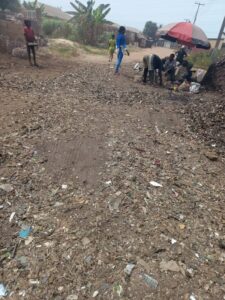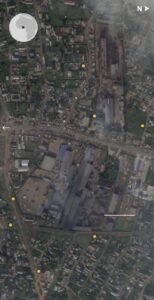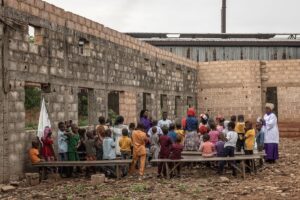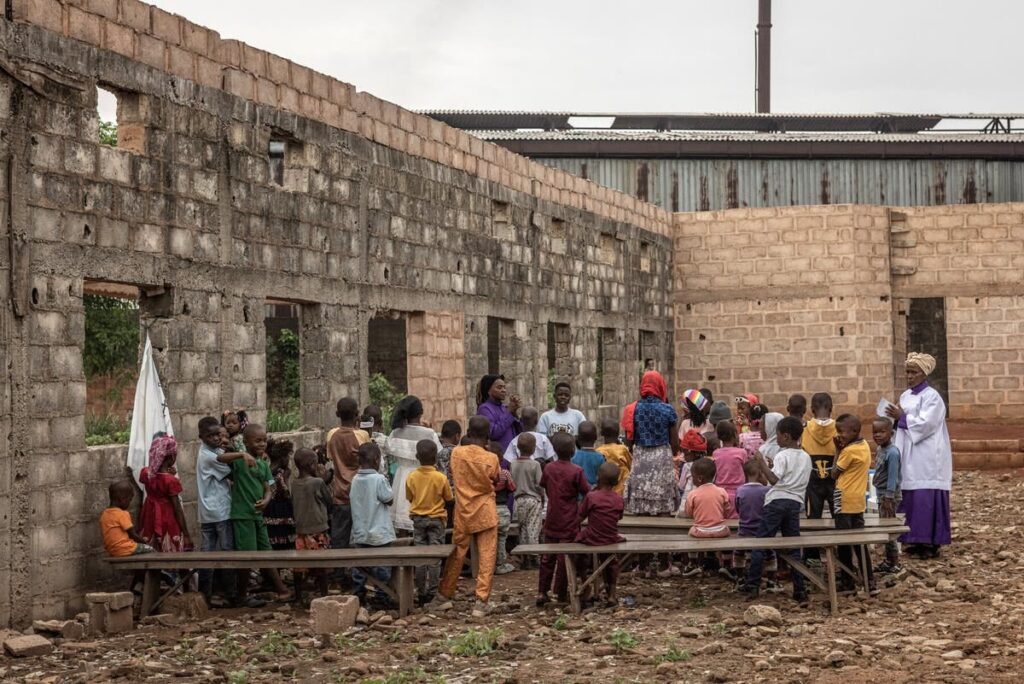Michael Babatunde
The air is different! For anyone coming into the community for the first time, you may likely suspect that this oxygen is not clean but for residents, there is nothing amiss, little do they know of the deadly substance penetration to the lungs – lead!
In this quiet town near Lagos, a hidden crisis is unfolding: factories that recycle car batteries are silently poisoning the community, especially children, with deadly lead. What many call “green recycling” is, in reality, a public health disaster.
Residents report black soot raining down on their homes, covering floors, gardens and schoolyards. This dust is not harmless ash — it’s contaminated with lead, released from crude smelting plants that melt old lead-acid batteries shipped from the United States and Europe.
A recent investigation by The New York Times and The Examination found disturbing evidence: of 70 people who volunteered for blood tests, seven in 10 had lead levels high enough to cause serious harm. Children in the area are particularly vulnerable; more than half of the children tested showed blood-lead levels associated with irreversible brain damage.
Soil and dust samples tell the same grim story — in some places, lead concentrations were recorded at 186 times the level considered dangerous by health experts. And with more than 20,000 people living within a mile of these plants, the scale of exposure is massive.
A failed system
The recycling process starts roughly: “pickers” salvage spent batteries, often from imported used cars, and sell them to “breakers.” These breakers hack open the battery casings by hand, draining acid and manually separating lead plates.
At nearby smelters, this lead is melted in primitive furnaces. The result? Toxic smoke billows into the sky, carrying lead particles into every corner of the community.
Critics say the auto industry loves to tout recycled lead as an “environmental win.” But in places like Ogijo, that narrative obscures the hidden human toll. Many companies rely on lax audits, preferring not to trace the lead’s origin — or to demand safer practices.

Heaps of waste dumped in communities by recycling companies for residents to scavenge on. Photo by Michael Babatunde for PLATFORM TIMES
Real People, Real Pain
Oluwabukola Bakare, works in one of the recycling plants — cleaning toilets and sinks. Her home lies within sight of a lead smelter. At night, black dust drifts through her windows. Her 5-year-old son, Samuel, had a blood-lead level of 15 µg/dL — far above the safe limit. Her older son, Israel, tested even higher.
Bakare’s own test revealed a level of 31.1 µg/dL, a concentration associated with severe health outcomes, including miscarriages and preterm birth. She worries about her children’s future and hers.
Local leaders have expressed frustration. The king of Ogijo, Kazeem Kashimawo Olaonipekun Gbadamosi, has publicly called for the factories to shut down. Yet, regulation is weak, and enforcement remains inconsistent.
Global Chain of Blame
The investigation traced how lead from Ogijo doesn’t just stay in Nigeria — it ends up in car batteries built for major automakers. These companies include household names like Ford, General Motors, and Tesla, and the lead even finds its way into batteries sold by Amazon, Lowe’s, Walmart, among others.

Sources: Soil analysis by Sustainable Research and Action for Environmental Development (SRADev Nigeria); Satellite image by Planet Labs.
Battery manufacturers and automakers often hide behind their suppliers. Many say they rely on intermediaries, who themselves rely on minimal “audits” — but these checks rarely ensure that lead is produced under safe, ethical conditions.
At least one major battery maker reportedly stopped sourcing lead from Nigeria after seeing the test results.
The Cost of “Green” Power
On paper, recycling lead is a climate-friendly choice: reuse rather than mine. But when the recycling process is unsafe, the local impacts are devastating. Experts warn that the human cost far outweighs the environmental gain.
In Ogijo, the symptoms of poisoning — headaches, seizures, memory loss, learning difficulties — have become commonplace. Experts note that no level of lead in the body is safe, especially for children.

A Sunday Bible session next to a lead smelting plant. Finbarr O’Reilly for The New York Times
Despite these warnings, regulators in Nigeria grapple with limited capacity. The government is stretched: battling security issues, corruption, and the need to provide even basic health services. Meanwhile, community demands for clean factories or safer practices have largely gone unheeded.
Can The Deed Be Undone
While the deed has been done, there is much left undone that could prevent more damage. Nigerian authorities must enforce environmental and health regulations in lead-recycling plants. Automakers and battery makers should commit to certifying their lead, ensuring it comes from safe and ethical sources.
It is important that the government and NGOs scale up testing, treatment, and support for affected communities (especially children).
These Factories should be supported (or pressured) to adopt safer, modern recycling methods — not primitive smelting that kills, just as Importing countries must accept some responsibility. If lead ends up in their vehicles, they should ensure its production doesn’t poison people.
The lead poisoning crisis in Ogijo is more than a local tragedy — it’s a symptom of a broken global recycling economy.
As the world shifts to “green” technologies, we must look behind the glossy narrative. Because for communities like Ogijo, the price of our convenience is paid in sickness, lost potential, and sometimes, life itself.
This report is based on an investigation by The New York Times and The Examination.
Do you want to share a story with us? Do you want to advertise with us? Do you need publicity for a product, service, or event? Contact us on WhatsApp +2348183319097 Email: platformtimes@gmail.com
We are committed to impactful investigative journalism for human interest and social justice. Your donation will help us tell more stories. Kindly donate any amount HERE




